Every King Day, invariably the same silly debates arise.
“King was cool, but he was into that nonviolence bullshit, and I don’t believe in that.”
“I know right? That shit ain’t gonna work. I’m more of a Malcolm X person myself.”*
This King Day, don’t waste your time debating about the “radicality” of violence vs. nonviolence. That’s making the mistake of confusing tactics and strategy.
What radical really means is “getting to the root”. Radicalism is not a function of tactics but of strategy.** It’s about whether or not your tactics are part of an actual strategy for transformation that gets to the root of the fundamental problem at hand. Any effort lacking an assessment of the root cause, and a course to address that root cause, is simply not radical. The question of “violence or nonviolence” doesn’t begin to address whether one has a clear understanding of the fundamental problem, why the problem, who can solve it, and how.
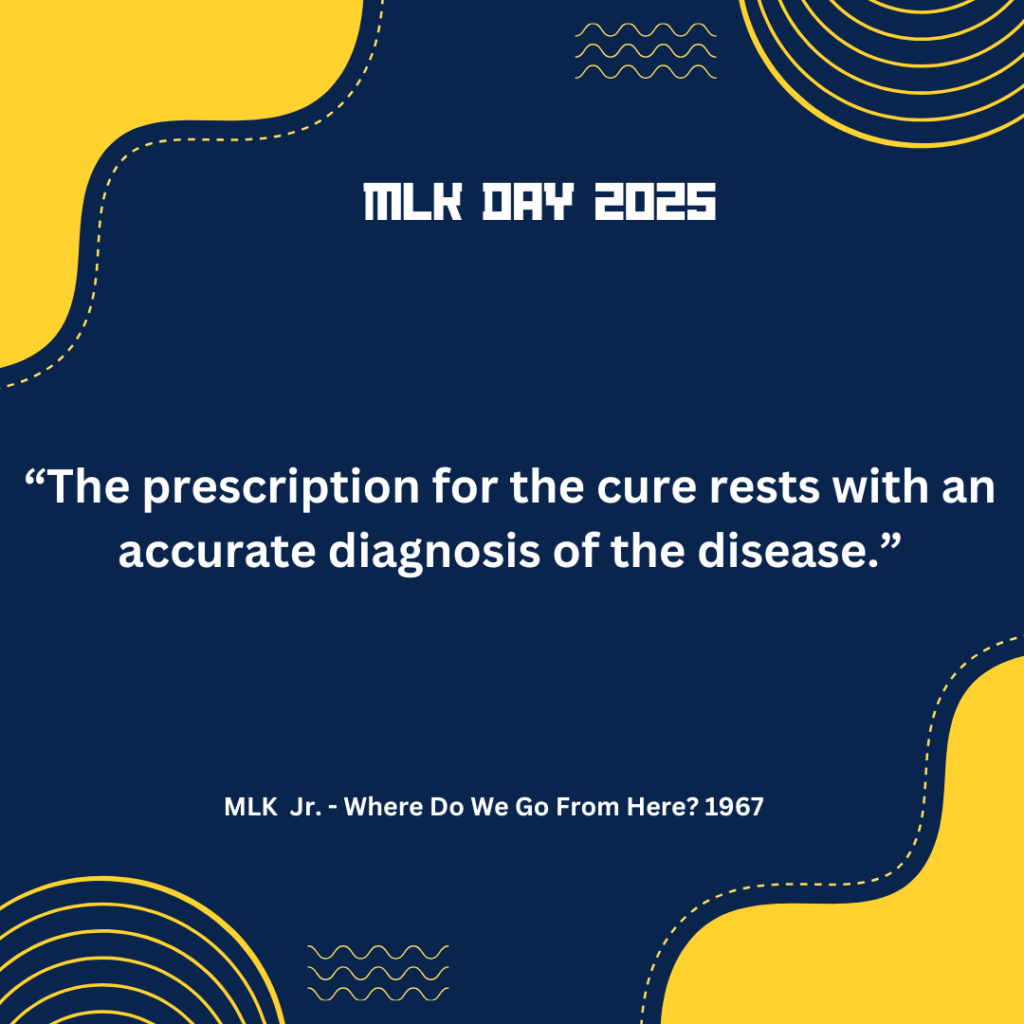
What made King radical (in the sense of getting to the root) was not nonviolence. What made King radical was that as he evolved as a leader through the experiences of the civil rights movement he began to place himself explicitly on the side of the poor of all races. He began to conceive of a strategy to end the root causes of the interconnected evils of racism, poverty and militarism – first making the correct assessment that all three actually cannot be separated from each other or solved independently of each other. Specifically, linking up with the National Welfare Rights Organization and leaders like Johnnie Tillmon helped stoke the flames of King’s growing radicalism and would lead to the development of the first Poor People’s Campaign of 1968.

These days, it’s possible for some people to make a damn good living off of endlessly describing all the symptoms and manifestations of the fundamental problem that we face. Very few actually offer an actual assessment of what needs to happen – based in a study of history, a scientific understanding of the basis for change, and an assessment of the current conditions and terrain. Fewer still are actually moving on that path with other people to unleash the human possibilities of our time.

Most (so-called “progressive”) leaders speak from the vantage point of their own experience, ignorant to the historical experiences of the working class over time. They have the wrong diagnosis of the disease, therefore they cannot write an accurate prescription. Their diagnosis of the problem is that it’s “white people”, Republicans, “the racial wealth gap”, and a myriad of other (literal) dead ends. They don’t actually focus on the system that concentrates great wealth in a very few hands, is destroying the natural world, and continuously reproduces the false ideologies that sustain it.
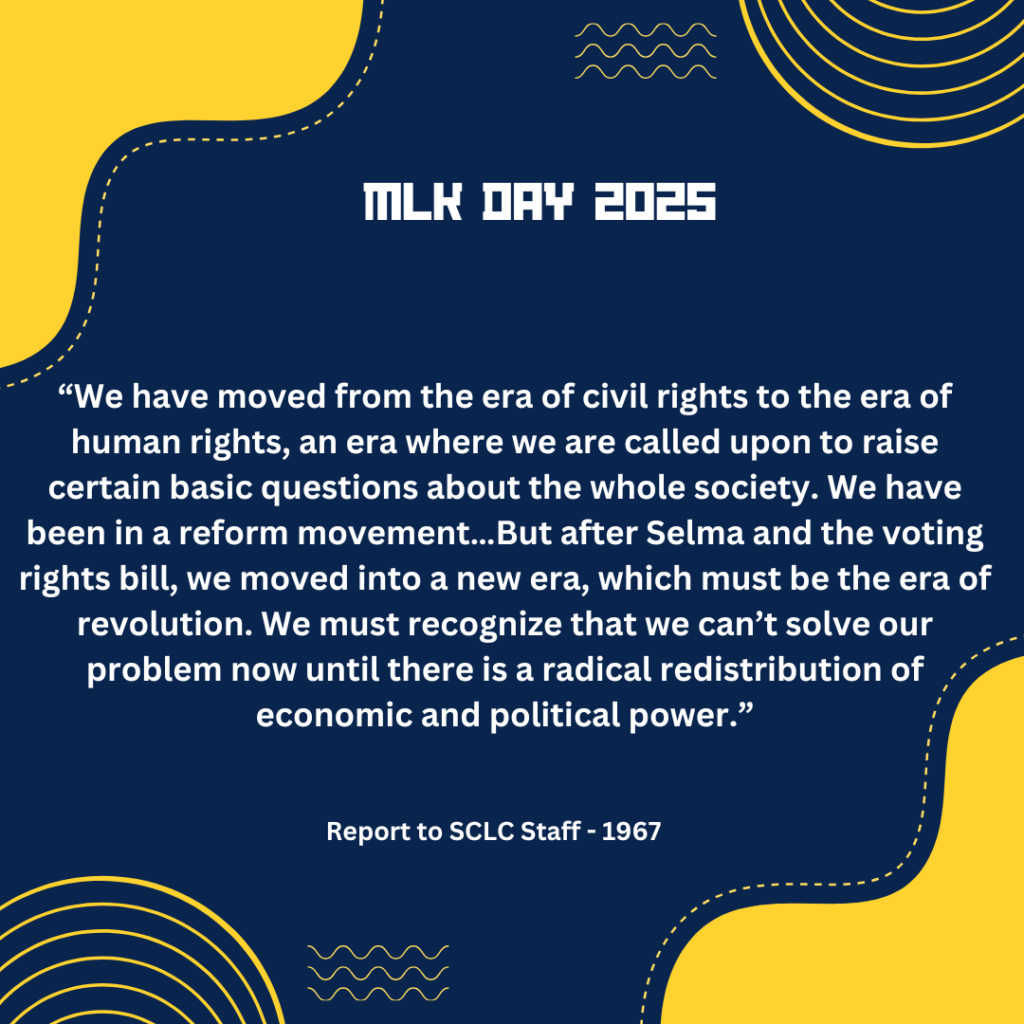
Learning the legacy of King – and particularly the deepening awareness he developed over time which brought him from a civil rights framework to a human rights framework, means committing yourself to a collective process of liberation. It means divesting yourself from the false solutions of “buying up the block” or “using passive income from rental properties”. If the solutions someone is preaching are individualist then they are not radical. Period.
Demands for “access”, “affordability” and “opportunity” are not in keeping with King’s legacy. As described in Dr. Colleen Wessel-McCoy’s definitive book on this topic, King argued that economic opportunity was not the same as the right to employment, decent wages, or a minimum income. We must speak and lead from the position of guaranteed human rights as our basic needs that must be secured by the society regardless of whether or not it’s good for Wall Street.
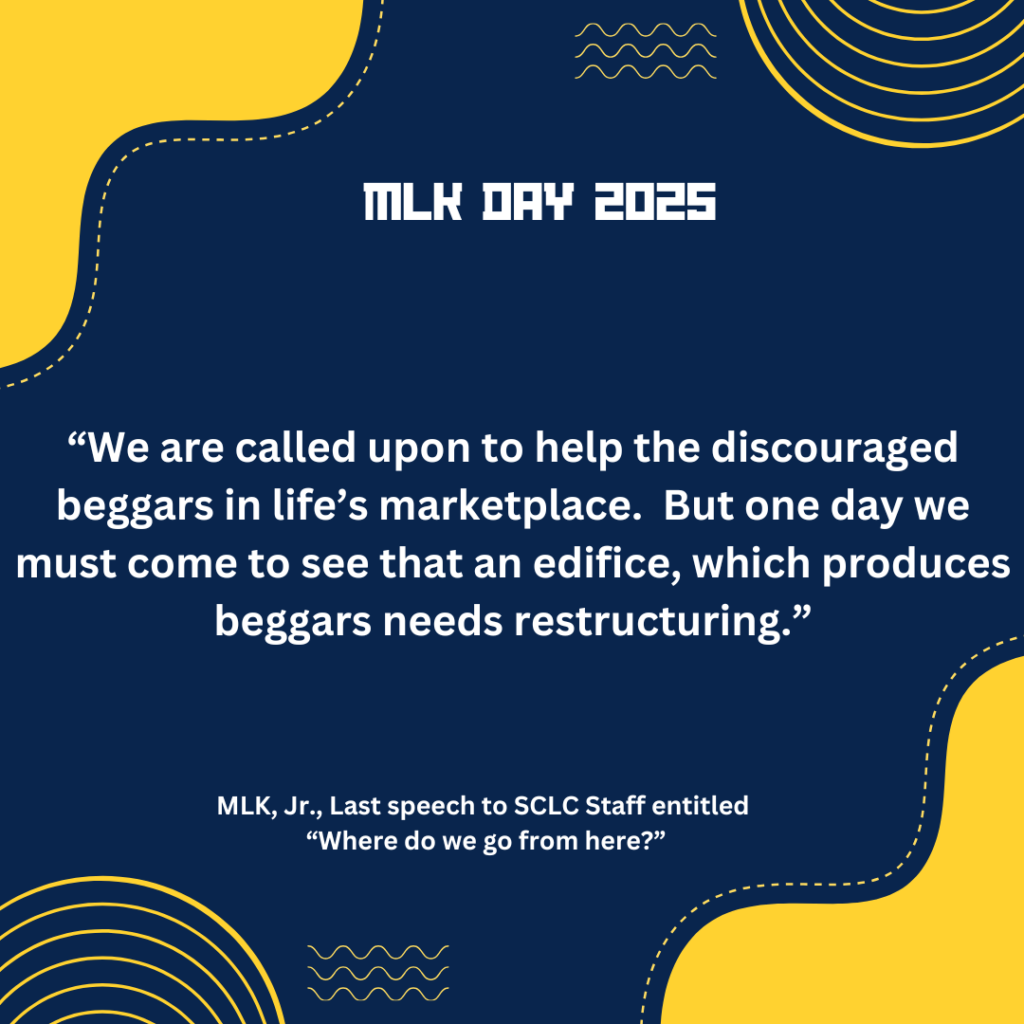
And it’s not just about our understanding – this is not an academic exercise. Humanity and the very planet is at stake. This is about taking action together.
Quoting from Wessel-McCoy: “The maintenance of oppression depended on the cultivation of a sense of incapacity and bewilderment among those who in reality hold the power to transform society. King argued the oppressed were ‘schooled assiduously to believe in their lack of capacity,’ blocked from understanding their own ‘latent strengths’. But taking action together would help them ‘break out of the fog of self-denigration’, study ‘the science of social change’, and ‘embark on social experimentation with their own strengths to generate the kind of power that shapes basic decisions. (Where do we go from here: Chaos or community)

Like Jesus, King was executed by the state.***
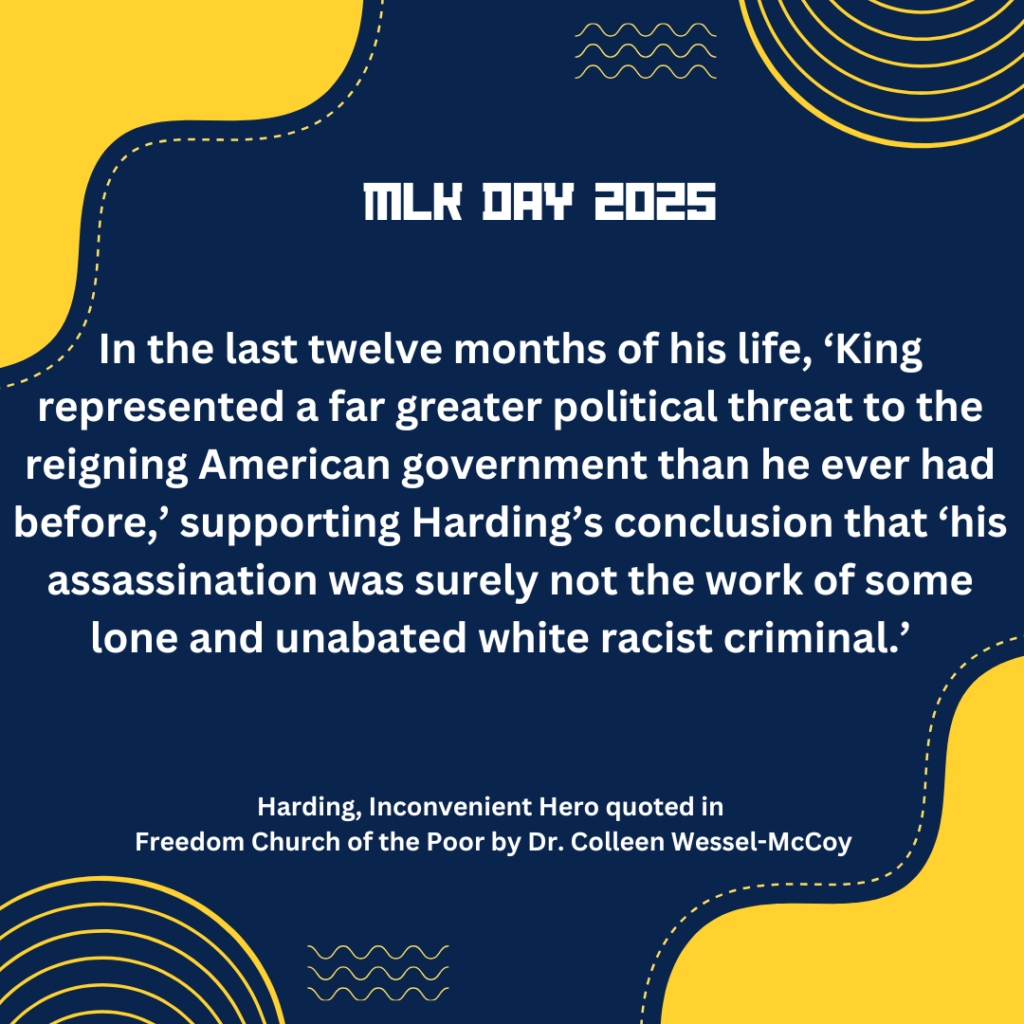
So let’s continue to deepen our understanding of King – particularly his evolution as a leader, the lessons he learned throughout the phases of his life, as well as why he was killed.
This King Day let’s take some moments to light a candle and say a prayer for the state of our nation and of our world – for all that has been lost because of the deep failures of distraction, division, false solutions, sectarianism, syndicalism, individualism, opportunism, co-optation and collaboration that have plagued the working class on its path to power.
Can you imagine, where we might be now if a national Poor People’s Campaign, wielding liberation theology with U.S. characteristics, had been building continuously since 1968? If we had continued to love our class, and to work to “kill the system before it kills us”? (Willie Baptist).
We don’t have a moment to lose. Every day we’re not organizing the working class, as a class, united across lines of division, is a day we’re losing ground.
——————————————————————————–
*[Malcolm X was a genius who deserves our love, respect and sincere study of his development over the course of his life (spoiler alert – neither King nor X were static figures and their thinking actually developed and changed significantly over the course of their lives)]
**[oversimplified definition for the purpose of this writing] Tactics are the like the tools in a toolbox, whereas strategy is like the blueprint of the house that you’re about to build.
***For more on that, check out “The Plot to Kill King” and “Orders to Kill” by William F. Pepper.
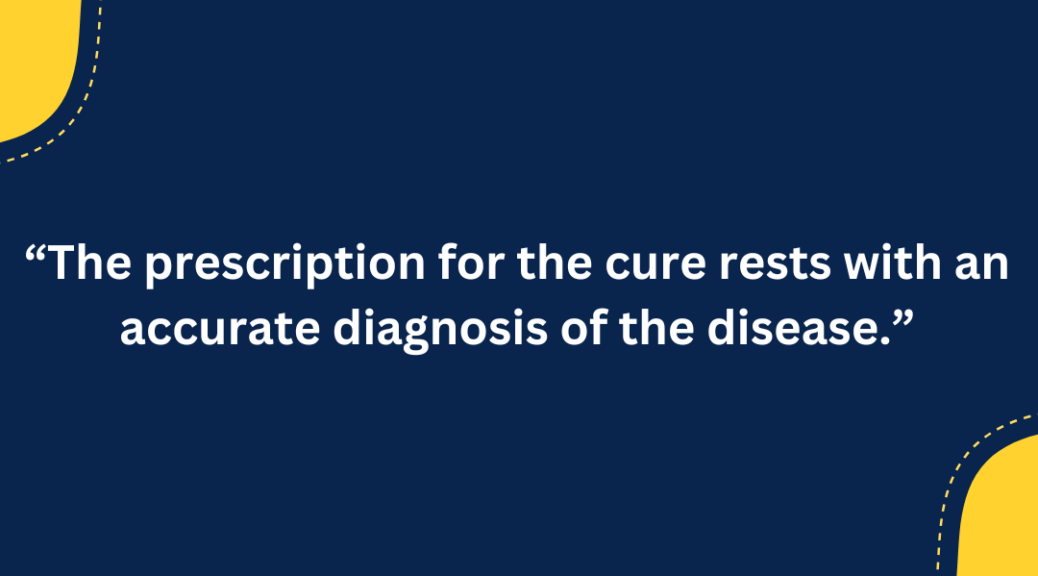
Love this Nimje! I’m getting to it a bit late, but just so thrilled to see this radical, loving, funny and comprehensive reflection on the legacy of Dr. King to guide us to transformation! Beautifully written.
thank you Barbara!